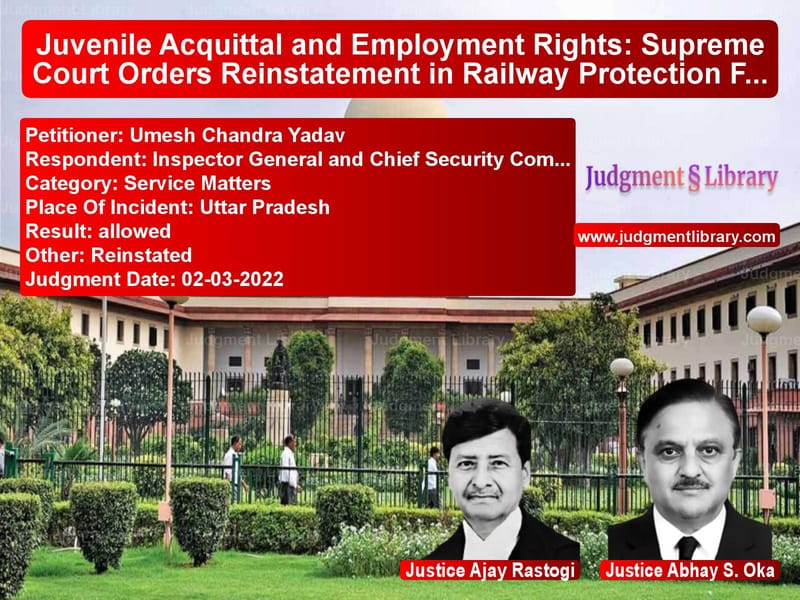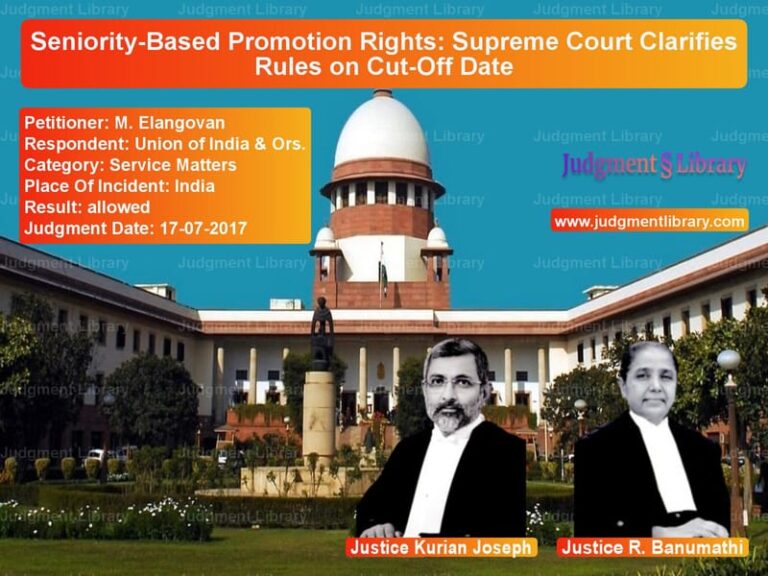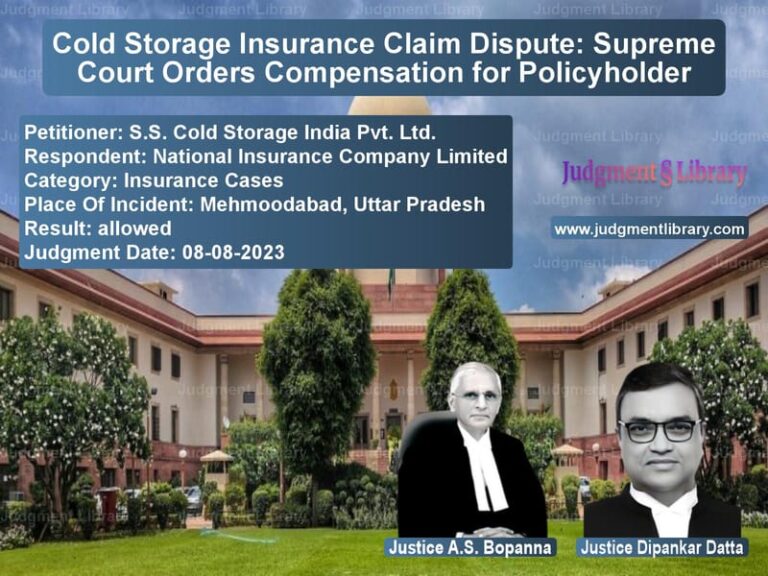Juvenile Acquittal and Employment Rights: Supreme Court Orders Reinstatement in Railway Protection Force
The Supreme Court of India has delivered a landmark judgment in the case of Umesh Chandra Yadav vs. Inspector General and Chief Security Commissioner, RPF, Northern Railway & Others. The ruling addresses the issue of whether an individual who was acquitted as a juvenile in a criminal case can be denied government employment on grounds of non-disclosure of past charges. The Court ruled in favor of the appellant, emphasizing the principles of fairness, rehabilitation of juveniles, and the right to employment.
Background of the Case
The appellant, Umesh Chandra Yadav, was accused in a criminal case filed on October 25, 1997, when he was only 12 years old. The case alleged that he had fraudulently prepared a forged caste certificate. However, after a thorough investigation, the trial court found no evidence to support the charges and discharged him on December 15, 2001.
In 2011, over a decade later, the Railway Protection Force (RPF) issued an advertisement for the recruitment of constables. Umesh applied for the post, went through the selection process, and was selected. He was sent for training at the Police Recruit Training Centre, Hoshiarpur on November 1, 2014. However, on February 19, 2015, his appointment was suddenly canceled, citing non-disclosure of his past criminal case in the attestation form.
Aggrieved by this, Umesh challenged the cancellation order in the Allahabad High Court. The Single Bench ruled in his favor, but the Division Bench overturned the decision, holding that suppression of past criminal proceedings justified his dismissal. He then appealed to the Supreme Court.
Legal Issues Considered
- Whether the non-disclosure of a past case, where the appellant was acquitted as a juvenile, constituted suppression of material information.
- Whether an individual who was a juvenile at the time of the alleged offense could be denied government employment on that basis.
- Whether the Division Bench of the High Court erred in rejecting the Single Bench’s decision.
- Whether the cancellation of employment was arbitrary and violative of the appellant’s rights.
Petitioner’s Arguments (Umesh Chandra Yadav)
- At the time of the criminal case, he was only 12 years old, making him a juvenile under the Juvenile Justice Act.
- The trial court had discharged him in 2001, meaning there was no conviction or pending case against him.
- He was never arrested or prosecuted; therefore, he truthfully answered “No” in the attestation form’s question regarding past prosecutions.
- Juveniles are protected under law, and their past records cannot be used against them once they are acquitted.
- His appointment was canceled arbitrarily without considering his discharge and juvenile status.
Respondent’s Arguments (Railway Protection Force, Northern Railway)
- The attestation form required candidates to disclose whether they had ever been prosecuted or arrested, and Umesh failed to do so.
- Even though he was acquitted, he was once accused of forging a caste certificate, which should have been disclosed.
- Failure to disclose any previous legal proceedings constitutes a material suppression of facts, justifying cancellation.
- Public service jobs require the highest levels of integrity, and suppression of information, regardless of acquittal, reflects dishonesty.
Supreme Court’s Observations
The Supreme Court thoroughly examined the facts and legal provisions. The Court observed:
- Juvenile Protection: The appellant was 12 years old at the time of the alleged offense. Under the Juvenile Justice Act, juveniles cannot be treated the same way as adults.
- Discharge vs. Conviction: The appellant was discharged by the trial court, meaning there was no case or pending charges against him.
- Attestation Form Interpretation: Since he was never arrested, prosecuted, or convicted, he truthfully answered the attestation form.
- Arbitrary Cancellation: The cancellation of his employment was unjust and against the principles of fairness.
- Rehabilitation of Juveniles: The Court emphasized that juvenile mistakes should not permanently affect a person’s career.
The Court stated:
“A juvenile cannot be expected to legally comprehend and be held responsible for an act that the law itself does not recognize as criminally punishable beyond the juvenile justice framework. The appellant’s non-disclosure cannot be treated as an act of deception.”
Final Judgment
- The Supreme Court set aside the High Court’s Division Bench order.
- The cancellation of the appellant’s appointment was declared illegal and arbitrary.
- The authorities were directed to reinstate the appellant with full benefits, including salary and seniority.
- The reinstatement order was to be executed within one month, and all arrears paid within two months.
Key Takeaways from the Judgment
- Juvenile records should not affect employment: Past cases against juveniles should not be used to deny jobs after they are acquitted or discharged.
- Non-disclosure must be assessed reasonably: If an individual was never arrested or convicted, they cannot be penalized for not mentioning a past case.
- Fairness in public sector employment: Arbitrary cancellations based on technicalities violate constitutional rights.
- Rehabilitation over punishment: The judgment reaffirms that individuals should not suffer lifelong consequences for childhood incidents.
Conclusion
This Supreme Court ruling is a milestone in protecting the rights of individuals who faced legal action as juveniles. It ensures that past accusations do not unjustly hinder future opportunities. The decision sends a strong message that employment decisions should be based on fairness, legality, and an individual’s present qualifications rather than past missteps as a minor.
Petitioner Name: Umesh Chandra Yadav.Respondent Name: Inspector General and Chief Security Commissioner, RPF, Northern Railway & Others.Judgment By: Justice Ajay Rastogi, Justice Abhay S. Oka.Place Of Incident: Uttar Pradesh.Judgment Date: 02-03-2022.
Don’t miss out on the full details! Download the complete judgment in PDF format below and gain valuable insights instantly!
Download Judgment: umesh-chandra-yadav-vs-inspector-general-an-supreme-court-of-india-judgment-dated-02-03-2022.pdf
Directly Download Judgment: Directly download this Judgment
See all petitions in Employment Disputes
See all petitions in Recruitment Policies
See all petitions in Public Sector Employees
See all petitions in Termination Cases
See all petitions in Disciplinary Proceedings
See all petitions in Judgment by Ajay Rastogi
See all petitions in Judgment by Abhay S. Oka
See all petitions in allowed
See all petitions in Reinstated
See all petitions in supreme court of India judgments March 2022
See all petitions in 2022 judgments
See all posts in Service Matters Category
See all allowed petitions in Service Matters Category
See all Dismissed petitions in Service Matters Category
See all partially allowed petitions in Service Matters Category







